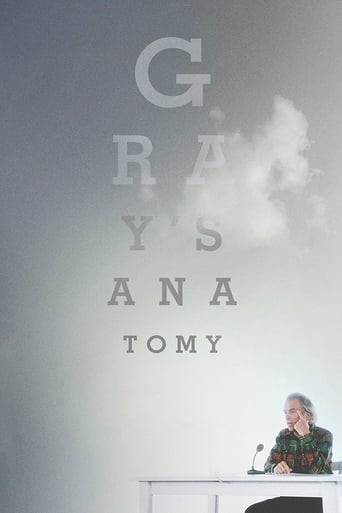framptonhollis
Like the greatest, most professional poet, Spalding Gray tells him stories at a swift, rhythmic pace that is exciting and brilliant all at once. With his pitch perfect timing and comedic wit, he weaves together here a masterpiece of the monologue as he recounts his bizarre, eye opening (yes, pun intended) adventure after he discovered he had an eye problem. Rather than simply accepting a surgery (he really doesn't like it when the doctors refer to their work as "scraping"), he attempts to work out alternative methods, which range from an all raw vegetable diet to traveling to the Philippians to visit a so called "psychic surgeon". As a master of the monologue, Gray tells this story miraculously well. He writes with a beautiful and distinct quality. Through his storytelling, he expresses himself in a truly unique and entertaining way, packing this one man show with laughs and personality.I must also praise the director, the famous Steven Soderbergh, who morphs this monologue into a visually stunning art film. Using music, sound, sets, props, camera movement, shadows, and plenty of other fascinating, experimental techniques, he turns Gray's witty writings into a much more cinematic and epic adventure that truly captures Gray's quirky and strange view of life.
bob the moo
When Spalding Gray is diagnosed as having an eye condition, he goes to a doctor to discuss a course of action. When the issue of surgery comes up it launches Gray on a journey to get a cure that sees him reconnecting with his Christian Scientology roots before other treatments including a physic surgeon, cutting out some foods and a Native American sweat lodge.Spalding Gray's monologues are very much a matter of taste -many audiences do not like spoken word shows or films and even those that do may not like Gray. I am of the mind that any story teller than can hold my interest for 80 minutes is worth listening to. As an ex-cleaner I have listened to many of my older colleagues talk ad infinitium about their medical problems but none did so with the wit and invention of Gray. He tells a simple story of alternative treatments and such but every little detail is painted with great words. He also manages to inject wit into it - the funniest moment being where he is told that he cannot eat fish (cause they eat certain sea cucumbers in the wild that have chemicals) and he cannot eat chicken because they feed fish to chicken; he finds a farmer's market selling fish bred in captivity (hence, he reckons, unlikely to have eat the sea cucumbers), buys it but then is told that they feed the fish ground up chicken!.Gray is captivating. At times he is a bit too hyper and his mannerisms are a little irritating in a spoilt Western-hypochondriac type of way, but this is just my prejudice getting in the way. He is a very good story teller and he makes for a good focus. The talking heads add value but really were unnecessary to carry the film. As director, Soderbergh finds himself with a difficult task: does he just point the camera and let the words do the work or does he try to mix it up? He goes for adding to the words and, in some cases he does (The Elvis of surgeons for example) but too often he just blurs the camera behind colours and rippled images. It still works but the words don't need help and often Soderbergh's influence is unnecessary even if it isn't unwelcome.Overall this is an enjoyable story that is very well told with words that do not only inform but paint and expand on the basic tales. Soderbergh feels that he must do something to justify the difference between film and stage and some of his influence works - but happily even when it doesn't it can be ignored. One of the more accessible and enjoyable of Gray's monologues, this film is a perfect way to reflect upon the man in the shadow of his untimely death.
craigjclark
Made during the time when Steven Soderbergh was in the process of reinventing himself (see also "Schizopolis," made the same year), this is a wonderfully inventive film with a kinetic visual style to match Spalding Gray's verbal gymnastics. This is the kind of film that stays with you long after you've finished watching it, thanks to Gray's performance -- he is a terrific storyteller -- and Soderbergh's imaginative staging.Caveat: If you're at all squeamish when it comes to graphic descriptions of eye injuries, this film may not be your cup of tea.
NJMoon
Like several of Spalding Gray's stage monologues "Gray's Anatomy" has been given the full feature film treatment, this time by "Sex Lies & Video" helmer Steven Soderberg. Gray's discovery of a visual malady leads him to medical and homeopathic treatment and serious consideration of the query "What is it you don't want to see?"This 90 minute monodrama is not opened-up in the traditional sense. Rather it is supplemented by monochrome interviews with Joe and Jane Q. Publics about their particular eye problems. Within the monologue itself, Soderberg employs a variety of lighting and camera trickery to keep the action from stagnating. Mostly, it is a successful endeavor. Though, oddly, the film lacks the overall impact of Gray's "Swimming To Cambodia" or even the lesser (but simpler done) "Monster in a Box". A fine addition to the Gray library.

